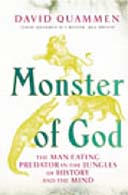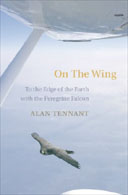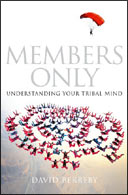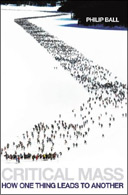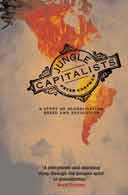Monster of God: The Man-eating Predator in the Jungles of History and the Mind
by David Quammen
516pp, Hutchinson, £25
TV executives in the US are fond of saying that there are only three certainties in life: death, taxes and Shark Week on the Discovery Channel. The extraordinary popularity of wildlife programmes - especially those featuring sharks, big cats and crocodiles - confirms our obsession with what David Quammen calls "the alpha predators": animals that not only kill humans, but eat them too. The relationship between human beings and this diverse group of creatures (linked by dietary preference rather than zoology) is the subject of this book.
According to Quammen, we are not quite as superior to these animals as we might think: indeed at times we are just another link in the food chain - and not at the top. Monster of God traces the development of our responses to the danger of "man-eaters" (he would prefer a more politically correct term, but has not yet found a better one). First, we were simply in awe of their power, and then we fought back, ultimately taking our revenge on them through wholesale massacre. Only in the 20th century, when most large predators had become globally endangered, did we finally consider protecting them.
But to use a cliché of which wildlife film-makers are rather too fond, it may now be too late. Quammen looks ahead to the year 2150, when the world's population is predicted to peak at 11 billion. By then, he believes, most of the alpha predators will have been eliminated.
So while he still can, he has gone to see some of them for himself. He travels to India for Asiatic lions, to northern Australia for saltwater crocodiles, Romania for brown bears, and finally to Siberia for the elusive Siberian tiger. At each location he finds the usual conflict between predators and people, refereed by dedicated conservationists whose task is made even more difficult by local and global politics.
For this book is as much about people and politics as it is about natural history. As an example of our power over the animals, Quammen describes an extraordinary episode in the life of the Romanian dictator Nicolae Ceausescu. The despised leader was brought by helicopter to a forest clearing, into which bears were driven so he could massacre them in cold blood - not hunting but butchery, as one observer noted acerbically.
In another episode, Quammen's flair for description encounters a suitably bizarre subject: the blow-by-blow account of the preservation of a gruesome crocodilian trophy for the Darwin chapter of Hell's Angels. From the bottom of a freezer, he lifts out a crocodile head - a sizeable armload, big as a duffel bag. Its left eye protrudes like a cup of raspberry sorbet. The front of the snout, from its last crazed struggle, is abraded down to the bone. A majestic and dangerous beast has died an unpretty death, and now someone hopes that its majesty can be recaptured, represented, owned and possessed (minus the danger) in the form of an artefact derived from this hunk of frozen, putrid meat.
These encounters, although fascinating in themselves, do not quite deliver the promise of the book's rather awkward subtitle. Following Quammen's brilliant non-fiction debut, The Song of the Dodo, this book feels a bit like that "difficult second album" - a collection of very readable but disconnected essays in search of a unifying theme.
And while he is excellent on biblical and classical examples, such as the story of Job and Leviathan, and Beowulf's encounter with Grendel, he chooses to ignore some more popular references. In a work dealing with the relationship between humans and alpha predators, the impact of the film Jaws on our attitude towards sharks surely rates a mention.
For me, the most interesting theme to emerge from the book is how an individual's relationship with these creatures can be defined by his or her socio-economic status. The poorer you are, the more likely it is that a meeting with an alpha predator will end in your death.
Here we encounter a paradox: those of us in western society may rarely encounter these animals in the flesh, yet we are probably more familiar with their lives than at any time in human history. Look at the recent success of BBC1's Big Cat Week, in which seven million people regularly tuned in to watch a television programme deliberately conceived, produced and marketed as a wildlife soap opera. Despite - or possibly because of - the danger they pose, we just cannot get enough of these magnificent beasts. To put it bluntly: rich people are entertained by predators; poor people are eaten by them.
Stephen Moss is a producer at the BBC Natural History Unit. His book on the social history of birdwatching, A Bird in the Bush, will be published in June by Aurum.
